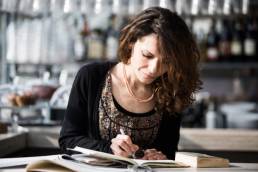Kate Milner
Kate Milner
Kate Milner studied illustration at Central St Martin’s School of Art and Design in London and her works have been published in magazines and shown in London galleries and national touring exhibitions. After a number of years raising her family and working as a librarian, Kate returned to illustration through a place on the MA at Cambridge School of Art at Anglia Ruskin University. My name is not Refugee began as a self-driven personal project while in the last year of her degree. My name is not Refugee was inspired by Kate’s daughter beginning a career as a teacher and by Kate’s own experience as a political campaigner. The brief she set herself was to address all the complexities of the European migrant crisis for a young but inquisitive audience.
The book won a Victoria & Albert Illustration Award in 2016. The judges said, ‘Despite its grave subject matter, it is illustrated with a cheerful anarchic quality that shows Milner’s indebtedness to the great illustrators of the past including Gerald Scarfe, Ralph Steadman and Ronald Searle.’ The judges praised Kate’s pencil and ink sketch-work with post-editing and colouring in Photoshop, her ‘expressive characters’ and her ‘most delicate use of line, shape and colour palette’. In 2016 Kate established the Twitter account @ABagForKatie, inspired by the film I, Daniel Blake. The account is a campaign to provide sanitary products for women using food banks.
Moreover, the book was selected for the Klaus Flugge Picture Book Prize 2018 and a candidate for Kate Greenaway Medal 2018.
Canizales
Canizales
Among frogs which sing in 16 bit, monkeys that jump from one branch to another throwing mangos, and birds-of-paradise hiding among the Colombian orchids, Canizales, when he was a child, listened to the stories told by the ancient spirits of the forest, in the shade of a Guava tree or with the sound of his house creaking in the night. These stories were so exciting that when he was at school, he pretended to take notes, while really he filled the pages of his notebook with the adventures of those magical creatures. The professors gave up on him and Canizales ended up studying fine arts and fine (and bad) words. His stories were so uncontainable that they started to appear on the newspapers as comic strips, and on television as animated short films, besides being exhibited as pictures on the walls of some galleries.
The noise of his hometown Cali was so loud that Canizales decided to move to an island, on the other side of the world, so that he could concentrate and allow his characters to live in the books he created for them. It is precisely in Maiorca that the green Witch started walking until she won Canizales the Apila opera prima prize in 2016.
Bruno the frog did not want to be outdone and won the Boolino prize for Canizales, still in 2016. Today Canizales is very happy to continue writing books and he still listens to stories of the forest and the night, but not only: he also listens to the stories of the cosmetic surgery operating rooms, of the school yards, of the libraries, of the credit card advertisements. He will also listen to the stories you want to tell him, if you write to info@canizales.eu..
Federica Iacobelli
Federica Iacobelli
Federica Iacobelli was born in Rome and raised in Naples. Today she lives in Bologna. She teaches screenwriting at ISIA (Superior Institute for Art Industries) in Urbino and writes documentary movies for the theatre and for Antenna International. As a dramatist, she collaborates with “Catarsi Passeggere” (“Temporary Catharsis”) together with Marinella Manicardi. When she worked for RAI (Italian Radiotelevision), she was a member of the team of authors of the popular children’s program L’Albero azzurro (The Blue Tree) and screenwriter of some episodes of the cartoon, Art with Matì and Dadà.
Among her published books: Uno studio tutto per sé (A study on its own) (Motta Junior, Pippi Prize writers for children 2008), the theatrical monologue Il était de mai, part of the anthology Théâtre en court 4 (Les Editions Théâtrales 2009, translated by Olivier Martinaud and Eleonora Ribis), La città è una nave (The city is a ship), which is part of the collection of childhood autobiographies “Gli anni in tasca” (Topipittori 2011), and the novel Storia di Carla (Carla’s story), belonging to the collection “I chiodi” (“The spikes”) directed by Matteo Marchesini (Pendragon 2015).


